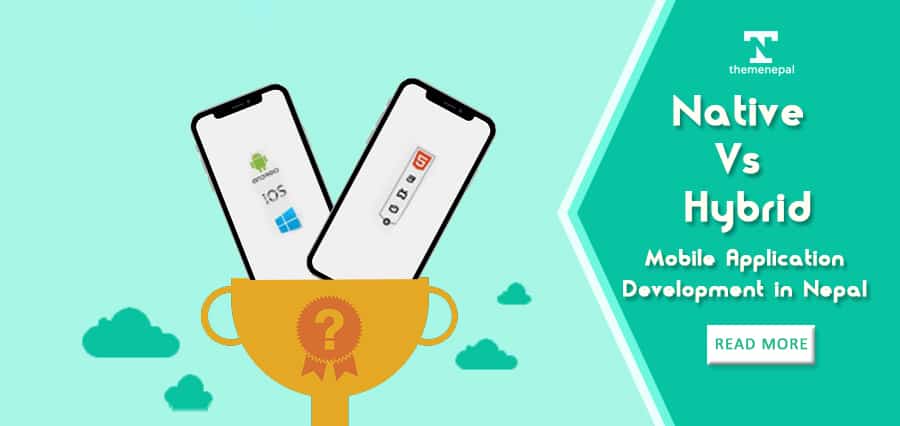Hybrid application (hybrid app) combines elements of both native and Web applications. Native applications are developed for a specific stage and installed. Web applications are widespread for multiple platforms and made available over the Internet through a browser. Hybrid mobile apps are built in a similar style as websites. Both use technologies like HTML, CSS, and JavaScript. However, instead of aiming a mobile browser, hybrid applications aim a WebView hosted inside a native container which enables them to access hardware capabilities of the mobile device. In present, most hybrid mobile apps influence Apache Cordova. It is a platform that provides an unswerving set of JavaScript APIs to access device through plug-ins, which are built with native code. Native vs hybrid mobile application development in Nepal– Themenepal.
Hybrid application features:
o It functions whether or not the device is connected.
o Integration with a device’s file system.
o Integration with Web-based services.
o It is an entrenched browser to improve access to dynamic online content.
When should you Choose a hybrid mobile app?
Before choosing a platform strategy, it is important to carefully evaluate the technical and non-technical virtues of hybrid versus alternatives like the native as it relates to your mobile application’s requirements. For example:
o Which mobile platforms is your target?
o Whether or not you plan to distribute your application via app stores?
o Do you look forward to utilize the capabilities of the mobile device?
o What technical abilities do your development team possess?
o Does the one-size-fits-all approach of the hybrid really live up to its expectation?
o These are some questions which are worth asking before boarding upon the development of a mobile application.
Native Mobile Applications
A native application is a software that has been developed to achieve some specific task on a particular platform or environment. A native application built using software development tools (SDK) for a certain software framework, operating system or hardware platform. Like iOS app built using iOS SDK, Android app built using Java Development Kit on Java platform, Swift and Objective C. Likewise, .NET required for Windows platform.
In a nutshell, native apps provide the best features, the best usability, and the best overall mobile functionality. These are a few things you only get with native apps:
o Fast graphics API – native platform delivers you the fastest graphics, which may be a very big deal if you’re using a lot of data and require a fast refresh or not a big deal if you’re presenting a static screen with only a few elements.
o Multi-touch – pinch-spread, double taps, and other compound UI gestures
o Fluid animation – related to the fast graphics API it gives you the ability to have fluid animation. This is especially important in highly interactive reporting, gaming, or intensely computational algorithms for transforming sounds and photos.
o Built-in components – The address book, geolocation, camera, encrypted storage and other features native to the device can be seamlessly integrated into mobile apps.
o Documentation – There are more than 2500 books for iOS and Android development, with many more blog posts, articles and detailed technical threads on sites like Stack Overflow.
“Hybrid Vs Native: Understanding Your Mobile Application Development Options”
Hybrid applications are native applications only because it can be downloaded from platform’s app store like a native app. It can get access to all the native platform features and can have performance close to a native app. It can be very tough to tell how a mobile application is made. Hybrid mobile apps are no different. A well-written hybrid app should not look or perform any differently than its native correspondent. More prominently, users don’t care either way. They simply want an application that works well. Trying to figure out if a mobile app is native or hybrid is like trying to differentiate rare grape diversities of wine. Unless you’re a sommelier or someone who really cares about it to the deep level, it’s not terribly important. What matters is that the wine tastes good. Same can be said for hybrid mobile apps; so long as the app does what it is supposed to do, who really cares how it was built?
The major differences between Hybrid and Native are listed below:
o Hybrid applications are built using web technologies like HTML, CSS, and JavaScript whereas Native applications are built with specific language and language for a specific platform like Swift for iOS, Java for Android.
o Hybrid apps can be built for any platform using a single code base.
o The hybrid app runs in WebView. It is a view that displays web pages, use the same engine of the browser but no browser like widgets.
o Native plugins essential to access the native features of the platform like camera, mic etc. They are like the wrapper on top of native libraries or components.
Why Hybrid App?
o It is a single code base for all platforms means write once and run anywhere but for native app situation, we need to build and uphold separate app and code for each platform.
o The same development team can carry an app for any platform including website as well because all required is web technologies.
o Hybrid App can be run on browser like any other website or can be run as Progressive Web App (PWA) since it is based on web technologies.
o Hybrid apps can achieve the same hardware-based performance speed as a native app.
o The hybrid app can have same and reliable user experience across platform irrespective of the user moves between different devices or browser.
The application development is simpler, faster, more rapid and the application is easier to sustain. You can change platforms anytime you want, Cordova allows you to build your application for more than one platform just by one adding a line of code. As for the phone hardware such as the Bluetooth or Camera, Cordova has a large source of plugins you may use.
Frameworks for Hybrid App development
Cordova is an open-source mobile development framework. Its Plugin helps to access device features. Cordova allows you to use standard web technologies for cross-platform development. Applications implement within wrappers targeted to each platform. It permits wrapping up of HTML, CSS, and JavaScript code depending upon the platform of the device. It encompasses the features of HTML and JavaScript to work with the device. The resultant applications are hybrid, meaning that they are neither purely Web-based (since they are not just Web apps, but are wrapped as apps for distribution and have access to native device APIs) nor truly native mobile application (since all layout rendering is done via Web views as an alternative to the platform’s native UI framework).
Ionic is the app platform for web developers. We can build amazing mobile, desktop, and web apps all with one web standards and shared code base. It uses Cordova behind the scene.
Other cross-platform app development frameworks are listed below:
o Titanium Appcelerator
o Xamarin (based on C#)
o Framework7
o Onsen UI
Conclusion
Both hybrid and native are ways to fulfill the different preferences and needs of users and developers. They have their weakness and strengths and it is up to you to decide which of them fits your application better.



